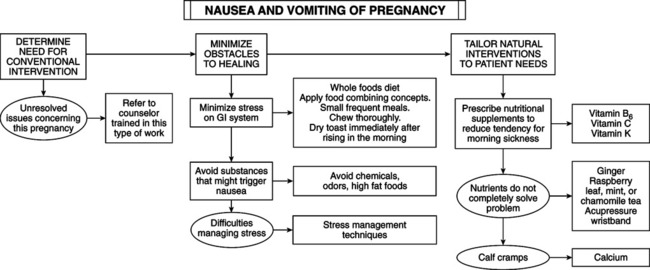• Nausea and vomiting of pregnancy (NVP) (“morning sickness”) occurs in 75% of pregnancies. A higher incidence occurs in the first trimester, but only 50% of cases resolve by week 14; 90% resolve by week 22. Eighty percent of women have nausea lasting all day. • Hyperemesis gravidarum (HG) is NVP with severe vomiting, weight loss, and dehydration. HG is serious, life threatening, and may require inpatient care. • The cause of NVP is a mystery. Possible factors include hormonal or digestive changes, blood and Qi imbalances, altered thyroid function, emotional blocks, improper nutrition, stress, and lifestyle habits. • Address individual mother rather than condition: physiologic and metabolic change (reduced gastric motility, oxidative stress or carbohydrate/vitamin B deficiency). Consider environment, emotional status, family, relationship, job or financial stress. • Both physiologic and psychological factors contribute. • Discuss whether pregnancy was planned and emotions of anger, fear, ambivalence, doubt, resentment, disgust, denial, or unresolved conflict. • Ask questions about family, relationship, job and finances, or stressors—environmental toxicity exposure. • Eat small regular meals to prevent stomach from completely emptying and blood sugar from dropping; both are linked to nausea and vomiting. • Drink plenty of fluids to prevent dehydration, another contributing factor. • HG, postpartum depression, and lactation failure are linked to deficiencies of zinc, magnesium, vitamin B6, essential fatty acids. • Prenatal multivitamin is needed to supplement even a healthy diet. Multivitamins decrease nausea and vomiting. • Pyridoxine (vitamin B6): B6 can improve or relieve NVP. Study dosage: 30 mg q.d. to 25 mg vitamin B6 every 8 hours. Combinations of B6, ginger, and acupressure are being studied. • Vitamins K and C: effective clinically when used together. Ninety-one percent of patients in one study had complete remission within 72 hours. Both vitamins alone show little effect.
Nausea and Vomiting of Pregnancy
GENERAL CONSIDERATIONS
Diagnostic and Etiologic Summary
THERAPEUTIC CONSIDERATIONS
Psychological, Emotional, and Lifestyle Aspects

Nutrition and Nutrients
![]()
Stay updated, free articles. Join our Telegram channel

Full access? Get Clinical Tree


Nausea and Vomiting of Pregnancy
